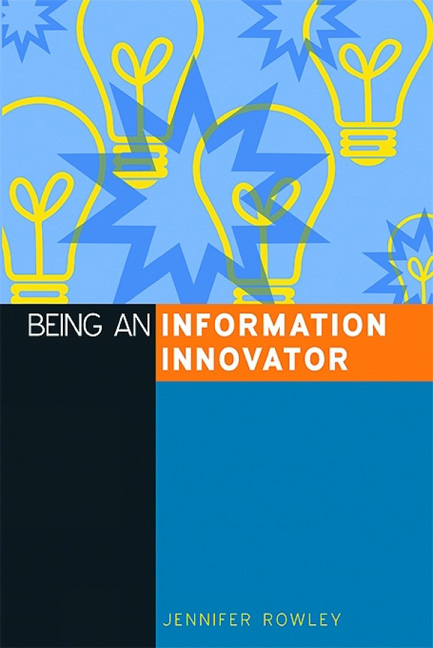3 - Entrepreneurship Co-authored by Siwan Mitchelmore
Published online by Cambridge University Press: 08 June 2018
Summary
Learning objectives
After reading this chapter you should be able to:
• Understand the development of the concept of entrepreneurship.
• Discuss what it means to be an entrepreneur and consider your role as an entrepreneur.
• Understand the unique characteristics of public entrepreneurship and their implications for information organizations.
• Reflect on the relevance of social entrepreneurship to information organizations.
• Appreciate the value of entrepreneurial co?mpetencies.
Introduction
The concept of entrepreneurship was introduced in Chapter 1. In this context we emphasized the concept of opportunity-centred entrepreneurship, and the links between innovation and entrepreneurship. The stance taken in this book is that entrepreneurship is the process by which individuals pursue opportunities without regard to the resources they currently control. The essence of entrepreneurial behaviour is identifying opportunities, and converting them into useful outcomes. Such perspectives are important and useful in understanding the relevance of entrepreneurship to a wide range of organizational settings, and offer preliminary insights into entrepreneurial behaviour. This chapter develops the theme of entrepreneurship further by taking an excursion around some of the ideas in the entrepreneurship literature that are likely to be the most helpful to information practitioners or aspiring information entrepreneurs. The objective of the chapter is to provide some concepts and frameworks to support entrepreneurs in developing their aspirations to make a difference into sustained, productive and effective entrepreneurial behaviour.
This chapter commences with a discussion of the development of the concept of entrepreneurship and, most specifically, its roots in commercial enterprises in which entrepreneurship is associated with the creation of new ventures, and the generation of profit. This is followed by a consideration of what it means to be an entrepreneur, and entrepreneurial characteristics, traits and behaviours. Next, there is an exploration of the contextual nature of entrepreneurship by developing discussion of public sector corporate entrepreneurship and social entrepreneurship, respectively. These two types of entrepreneurship offer the most useful insights into the practice of entrepreneurship for the information professional. Finally, the focus shifts to a discussion of entrepreneurial competencies, those competencies that are key to successful entrepreneurship.
- Type
- Chapter
- Information
- Being an Information Innovator , pp. 63 - 100Publisher: FacetPrint publication year: 2010



